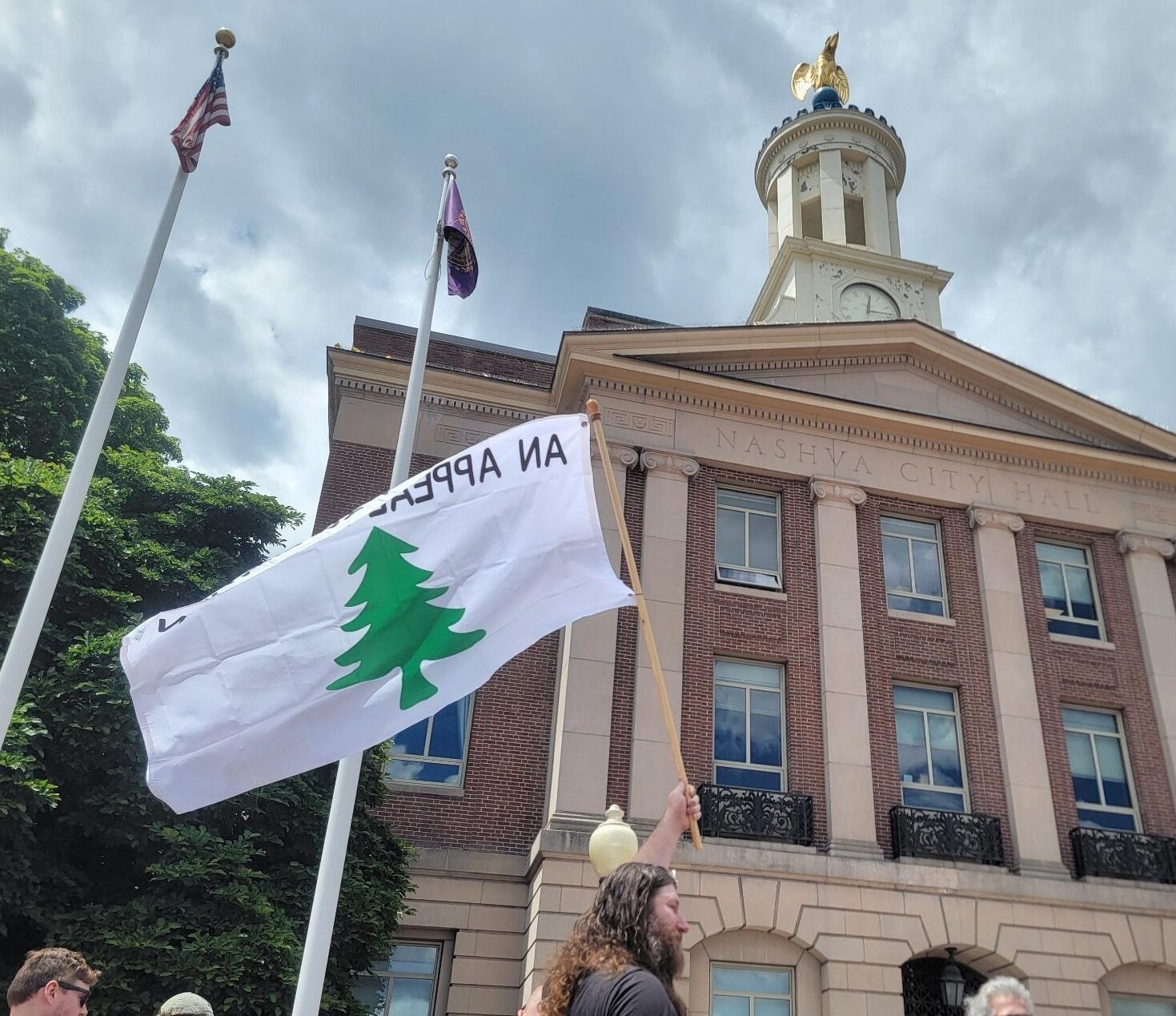Nashua City Attorney: Israeli Flag Too Controversial to Fly at City Hall

The Israeli flag, the white and blue banner with the Star of David, is the official symbol of the state of Israel, one of America’s closest allies. And yet the City of Nashua told a federal judge Israel’s flag is too controversial to fly at City Hall Plaza.
The Pride flag, on the other hand, is more than welcome on Nashua city property, despite being an entirely political symbol of the LGBT movement.
Nashua’s Assistant Corporation Counsel Jonathan Barnes said flying Israel’s flag would spark a flood of angry phone calls and threats, while “reasonable citizens” wouldn’t be bothered by the Pride flag.
Those revelations came last month in federal court as part of the city’s legal defense against a lawsuit filed by resident Beth Scaer. The city rejected her requests to fly the Pine Tree Riot flag and a banner promoting girls-only sports on Nashua’s public flagpole. Scaer claims she’s the victim of viewpoint discrimination by the Democrat-controlled city. She is represented by the Institute for Free Speech and local counsel Roy McCandless.
In the wake of the lawsuit, Nashua Mayor Jim Donchess quietly ended the city’s community flag pole tradition.
During the Nov. 5 hearing before Judge Talesha Saint-Marc, Nashua’s Assistant Corporation Counsel Jonathan Barnes compared the Pine Tree Riot flag to a Nazi flag and a flag for the Soviet Union.
Barnes also brought up the city’s decision to reject a request by Nashua resident Nick Scalera to fly the Palestinian flag on a day set to remember the anti-apartheid movement in South Africa. He says that proves the city was not discriminating based on a particular viewpoint.
And, Barnes added, “If someone applied to fly the Israel flag, I would say you would probably reject that, too, because it’s just — you don’t want to wade into those waters. You want to be able to conduct your city business without getting inundated with angry phones, e-mails, and people threatening you on Twitter, or X, whatever it’s called now.”
Saint-Marc noted that “at one point the city accepted the Pride flag. That’s still a controversial position.”
Barnes responded by invoking American Freedom Defense Initiative v. King County (2016) In that case, ads featuring the images of Islamist terrorists were rejected by the transit system, which argued they weren’t suitable. AFDI sued, lost in the lower courts and the U.S. Supreme Court declined to take up the case. The district court ruled the space was a “limited public forum” and that the system’s restrictions were “reasonable and viewpoint neutral.”
“In American Freedom Defense Initiative the ban on less controversial advertising was upheld. It wasn’t all controversial advertising,” Barnes argued.
“So, in the grand scheme of things, you know, there are Pride flags flown all over the country. The White House lights up with the colors in June. There are parades all over the country. There might be some people that are upset by that, but there are some people that are upset by the American flag. They would sooner (fly) the Soviet flag fly. Most reasonable citizens don’t find that subject matter to be controversial,” Barnes said.
“The Pride flag?” the judge asked.
“Correct,” Barnes replied.
“I think some reasonable citizens may disagree,” Saint-Marc said, to which Barnes replied, “Some might, but it’s less controversial than, say, a swastika.”
The city’s argument that the official flag of the nation of Israel is too controversial to fly, and suggesting that “reasonable citizens” would object, raised eyebrows.
“The City of Nashua’s terrifying argument demonstrates why free speech is so important,” said Institute for Free Speech attorney Nathan Ristuccia. “We cannot trust the government to decide whose views are too controversial to be permitted.”
Steve Bolton, Nashua’s long-time lead corporation counsel, tried to clean up the city’s position. He told NHJournal Barnes’ comments about Israel were part of a speculative argument that does not reflect the views of Mayor Jim Donchess or the Board of Aldermen.
“It was hypothetical, but that’s certainly not the position of the City of Nashua,” Bolton said.
Barnes was not in the office Wednesday and did not respond to requests for comment.
Israel is a United States ally and the only democracy in the Middle East. It’s also fighting a war against antisemitic terrorist organizations backed by Iran following the brutal Oct. 7, 2023, Hamas attack in which 1,300 people were murdered.
For his part, Scalera does not understand how Nashua is deciding which flag to fly. He said he was told the city would not fly the Palestinian flag due to the ongoing war.
“The City of Nashua has not shied away from flying the flags of foreign nations, especially foreign nations involved in active conflict. For example, in the wake of Russia’s illegal and brutal invasion of Ukraine, the City proudly raised the Ukrainian flag in solidarity with the people of Ukraine, as well as the Ukrainian population here in Nashua,” Scalera told NHJournal.
Scalera was also told by members of the Board of Alderman that Nashua would not allow a flag from a territory, like Palestine, that is not officially recognized as a nation.
“However, Nashua has also raised the flag of Kurdistan, which is at this point in time an autonomous region, and hopefully one day a nation-state, but nevertheless was not one at the time of the flag raising,” Scalera said.
Documents filed in the case show the city recently approved a day celebrating the Dominican Republic, which is currently accused of ethnic cleansing for its handling of Haitian refugees. The city also flew a Pride flag last year on orders from Donchess. However, a request for a pro-life flag to celebrate the overturning of the Roe vs. Wade decision was rejected.
“Censorship,” said state Sen. Kevin Avard (R-Nashua) when asked about the case.
“It all boils down to whom the mayor and alderman of Nashua are comfortable offending and who they would rather not. The Pine Tree ‘Appeal to Heaven’ folks, or the Rainbow Flag-LBTQ community. It doesn’t sound like they want to hear from people of faith.”
And Rep. Judy Aron (R-Acworth), a Jewish member of the New Hampshire House and an outspoken defender of Israel, called the city’s actions “sad.”
“If the leaders of the City of Nashua can’t handle free speech, then perhaps the decision to end the traditional program is sad and disappointing but probably a good decision.”
Aron offered her own solution. “They should just fly a white flag of surrender.”






